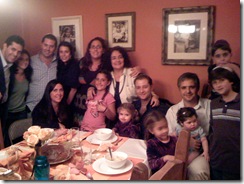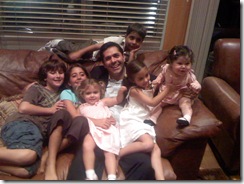When my Dad passed away, I struggled a lot at the beginning with the concept of doing Kaddish. Kaddish is a Jewish prayer where one exhalts, praises and blesses G’d. It is a blessing recited by people who have lost a close relative (parent, child, sibling, or spouse). The first year after the passing of the family member, it has to be recited on a daily basis, three times a day, at temple.
It was a significant time commitment, but that did not trouble me.
What most bothered me about Kaddish was the seemingly arrogant conceit that G’d would even care about our blessing him. Why is this even necessary? Why would the all-powerful, omnipresent, life force care about our singing him praises? Who do we think we are? Why does this matter?
Rabbi Scheinberg from San Antonio, Texas asked me to give this a shot, for one month. And if I didn’t find meaning in it by then, we’d find something else for me to do to honor my Dad’s memory. (He also asked me to read Pirkei Abott, which if anyone – Jewish or not Jewish – has not done, I strongly recommend). My Dad was not religious, but he had done Kaddish for his Father and I felt it was important I do the same. So I tried.
I found over the course of that month and year, which coincided with the year when OneVoice and PeaceWorks both started growing very fast, that the daily prayers helped me gain strength and focus. They enabled me to channel my pain at those moments of the day, and then get through the rest of the day. They also helped me stay grounded and keep things in context.
There is an intellectually interesting Rabbinical theory about the concept of how G’d needs to contract its force and presence in order to let us gain our freedom of choice, and how our prayers – our mental exercises and meditation – help in turn expand the influence of G’d force. Ying Yang.
The helpful but repetitive book Kaddish by Leon Wieseltier details the political history of Kaddish services, and how they helped communities keep Judaism alive.
Certainly affirming God’s righteousness at a time when you are most vulnerable and upset by the pain of losing those you love the most is a powerful and difficult exercise.
But what is most compelling about Kaddish and all other rites of Judaism related to mourning is how much these are designed to help one cope with the loss, by providing clear moments for introspection but by also requiring us to live our lives, by providing different phases for mourning that help us graduate slowly back into daily life, from the first week (when you sit Shiva at home with your family, cocooned inside under the mantle of your loved one’s still present energy), to the first month (where you cannot cut your beard or hair and still are raw with the pain of loss and the hovering presence of your loved one), to the first eleven months, where you have to avoid "Simcha" or Joys as, it is told, the soul of your loved one rises up to the Shchina, or eternal light… …throughout all these phases, Judaism is there to help you cope.
















